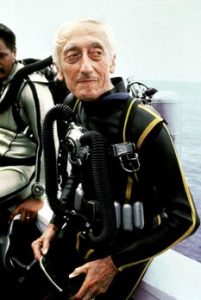18 Jul National Marine Week and the Role of Marine Scientists
The annual celebration of National Marine Week reminds us of the importance of our oceans and the incredible diversity of marine life that inhabit them.
Our oceans cover more than 70% of the Earth’s surface and are home to a staggering array of life forms, with a rich tapestry of marine biodiversity from microscopic plankton to majestic whales.
It is a time to reflect on the fragility of our marine ecosystems and to highlight the crucial role of marine scientists in understanding and protecting these vital environments.
Get Involved During National Marine Week

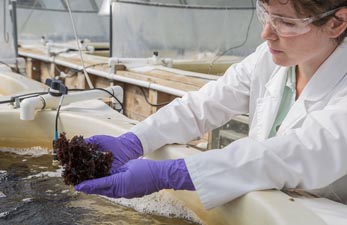
Take the opportunity to learn more about our oceans and the vital work of marine research.
You may want ideas on how to celebrate. You could visit an aquarium, a marine research centre, or participate in a beach clean-up to engage with marine conservation efforts.
You can also support organisations dedicated to marine protection or you may even consider pursuing a career in marine science by taking a relevant university degree in a field like marine biology, animal science or zoology.
The Role of Marine Scientists
Marine scientists play a fundamental role in studying and safeguarding our oceans. These dedicated researchers explore the depths of the sea to investigate the impacts of human activities on marine ecosystems and develop strategies for sustainable ocean management. They use a combination of cutting-edge technologies, fieldwork, and laboratory experiments to conduct research on topics such as marine biology, oceanography, marine conservation and climate change.
Marine scientists help us better comprehend how marine ecosystems function, the effects of pollution and climate change on marine life and the potential solutions to protect and restore our oceans.
The Importance of Laboratory Research in Marine Science
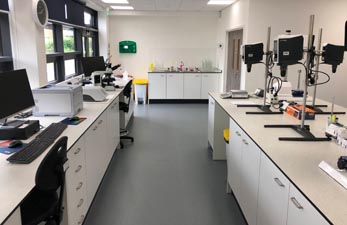
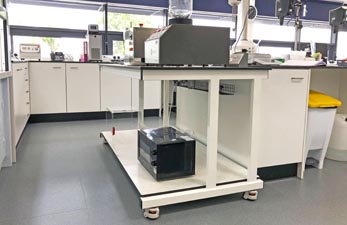
Laboratory research plays a crucial role in advancing our understanding of the complex ecosystems that exist beneath the ocean’s surface. Marine science encompasses a wide range of disciplines, from marine biology to oceanography, and laboratory work serves as a vital tool for studying marine life, ocean chemistry and the impacts of human activities on marine environments.
Understanding Marine Life
One of the primary goals of laboratory research in marine science is to study the diverse life forms that inhabit our oceans. By conducting experiments in controlled settings, researchers can observe the behaviour, physiology, and interactions of marine organisms under specific conditions. This allows scientists to uncover new insights into the adaptations of marine species, their roles in the ecosystem and the threats they face from environmental changes.
Investigating Ocean Chemistry
Laboratory research is also essential for studying the chemical composition of seawater and its impact on marine life. Oceanographers analyse water samples collected from different depths and locations to measure factors such as salinity, pH, nutrient levels and pollutants. By studying these variables in the lab, researchers can track changes in ocean chemistry over time, identify sources of contamination and assess the health of marine ecosystems.
Assessing Human Impacts
Human activities, such as pollution, overfishing and climate change, pose significant threats to marine environments. Laboratory research allows scientists to simulate the effects of these stressors on marine organisms and ecosystems, providing valuable insights into their ecological impacts. By conducting controlled experiments, researchers can evaluate the resilience of marine species to environmental pressures and develop strategies for mitigating the negative effects of human activities on the ocean.
Advancing Conservation Efforts
Laboratory research plays a key role in informing and guiding marine conservation efforts. By generating data on marine biodiversity, ecosystem dynamics, and environmental trends, scientists can identify priority areas for protection, establish marine reserves, and implement sustainable management practices. Laboratory studies also contribute to the development of innovative solutions for preserving marine habitats, restoring degraded ecosystems and recovering threatened species.
3 Major Contributors to Marine Science
1. Captain James Cook (1728 –1779) was a British explorer and navigator who mapped uncharted territories of the Pacific Ocean and made significant contributions to marine science through his expeditions in the 18th century.
Some of his key contributions include:
Observations of Marine Life: Cook and his crew meticulously documented the flora and fauna they encountered during their voyages. Their observations of marine life, including new species of plants and animals, helped expand scientific knowledge of biodiversity in the Pacific region. Cook’s expeditions also laid the groundwork for future studies in marine biology and ecology.Oceanographic Discoveries: Cook’s voyages involved extensive scientific investigations of ocean currents, water temperature, and marine phenomena. His meticulous recording of these observations contributed to the early development of oceanography as a scientific discipline. Cook’s expeditions provided valuable data on oceanographic processes that influenced subsequent research in marine science.
2. Jacques Cousteau (1910 – 1997)
Image Source – Donal Clancy
As a French oceanographer, explorer and filmmaker, Cousteau made numerous ground breaking contributions to marine science.
Some of his key contributions include:
Research and Exploration: Cousteau led numerous expeditions and research projects that provided valuable insights into marine ecosystems and biodiversity. His exploration of the world’s oceans led to the discovery of new species, underwater habitats, and marine phenomena. Cousteau’s research laid the foundation for advancements in marine biology, ecology and oceanography.Invention of the Aqua-Lung: Cousteau co-invented the Aqua-Lung, or scuba gear, which revolutionised underwater exploration. This portable device allowed divers to breathe underwater independently, enabling them to stay submerged for longer periods and conduct in-depth research on marine environments. The Aqua-Lung opened up new possibilities for studying marine life and ecosystems.
Pioneering Underwater Filmmaking: Cousteau was a pioneer in underwater filmmaking, using his innovative techniques to bring the beauty and complexity of the ocean to audiences around the world. Through his documentaries and television series, such as “The Undersea World of Jacques Cousteau,” he raised awareness about marine conservation, inspiring a whole generation to appreciate and protect the oceans.
Through his work as a filmmaker and educator, Jacques Cousteau highlighted the threats facing the oceans, such as pollution, overfishing and habitat destruction. Cousteau’s advocacy efforts helped raise public awareness about the importance of preserving marine ecosystems for future generations.
3. Emily Cunningham
Image Source – ENDS REPORT
As a contemporary English marine biologist, dedicated ocean advocate and a respected conservationist Emily has inspired many and secured £5.6 million in funding for pioneering conservation projects in the UK.
Some of her key contributions include:
2023 UK Women of the Future Award recognising her significant contributions to ocean conservation, both in the UK and internationally.
2024 ENDS Report Power List named as one of the 100 environmental professionals who made the greatest impact in the previous two years.
Marine Conservation Society served on the board the UK’s leading marine conservation organisation.
#Motion4theOcean co-founder of the model Local Government Ocean Recovery Declaration, already adopted by 29 local governments and presented at the UN Ocean Decade Conference 2024.
As we strive to protect and conserve our oceans, laboratory research will continue to play a critical role in shaping our understanding of the marine world and guiding sustainable management practices for the future.
Klick are fully supportive of the advancement of marine science and encourage the development of well-designed efficient laboratories that facilitate research and the protection of vital marine environments.
Example Laboratory Design for Marine Research
Acadian Seaplants are dedicated to the study, management and protection of seaweeds and other marine life.
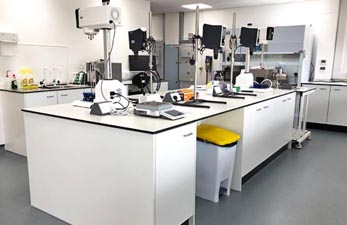
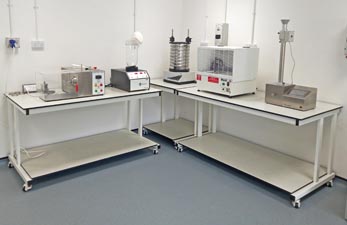
Klick designed the layout and furniture for Acadian Seaplants’ first UK laboratory in the Malvern Hills Science Park.
Their processes required a combination of mobile and fixed laboratory furniture. Large mobile laboratory workstations have proved invaluable in accommodating and transporting heavy machinery in the prep area where there are frequent changes to the layout. In the formulation lab they use smaller equipment and flexibility is less important, therefore a large, fixed island was designed with storage units below.
Testimonial:-
“During the installation the fitting team were helpful and worked around our timetable. The quality of the furniture is excellent, and the labs work perfectly for our needs.”
Dr Sarah Maude – Vice President, Technology, Acadian Seaplants Limited
If you would like to discuss the design of a facility to accommodate your particular field of laboratory research please feel free to contact our consultants by email or call 0161 998 9726.
Sources and Further Reading:
10 Ways To Celebrate National Marine Week
https://www.getactivewithanimals.com/blog/read_195477/10-ways-to-celebrate-national-marine-week.html
Acadian Seaplants
https://www.acadianseaplants.com/
The Marine Biological Association
https://www.mba.ac.uk/about-us/
Emily Cunningham.co.uk
https://emilycunningham.co.uk/
SEVENSEAS Media
https://sevenseasmedia.org/emily-cunninghams-passion-for-oceans-earns-her-top-uk-women-of-the-future-award/#:~:text=In%20a%20remarkable%20achievement%20for,in%20the%20UK%20and%20internationally.
ENDS REPORT
https://www.endsreport.com/article/1874192/power-list-2024-uks-100-influential-environmental-professionals
Wikipedia – Captain James Cook
https://en.wikipedia.org/wiki/James_Cook#:~:text=Navigation%20and%20science,-A%201775%20chart&text=Cook’s%2012%20years%20sailing%20around,Pacific%20was%20a%20major%20achievement.
Britannica Jacques Cousteau
https://www.britannica.com/biography/Jacques-Cousteau
Donal Clancy
https://donalclancy.wordpress.com/tag/aqua-lung/



